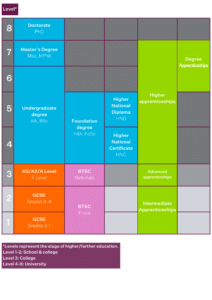Apprenticeship guidance
Information, advice and guidance for young people interested in apprenticeships.
93%
of apprentices remain employed once they’ve finished their apprenticeship
An apprenticeship is a job with training which means you get paid to learn as well as work. Apprenticeships allow you to get practical work experience, to build your CV and pay you to study a related course alongside it with a college or training provider. To pass your apprenticeship, you’ll need to demonstrate that you’ve developed certain knowledge, skills and behaviours.
Did you know… 93% of apprentices remain employed once they’ve finished their apprenticeship?
Apprenticeships have sometimes been viewed as a ‘back-up’ option next to going to university. In fact, most Further Education colleges still push all young people on a Level 3 course to apply for university, whether it’s the best option for them or not. The apprenticeship landscape has changed incredibly over the last 10 years, with more and more employers seeing the value of offering vocational pathways, to share the wisdom of their experienced employees with the new generation of workers.
Extra tip:
Don’t forget to share your plans with your teachers, social workers, personal advisers and carers.
They know you well and can offer advice and guidance on your options. You should include your hopes and plans for your education or career in your Pathway Plan. Pathway Plans begin no later than 3 months after your 16th birthday and should be regularly reviewed and updated for as long as the local authority is offering support. If you are planning to stay in education or do an apprenticeship, this should be written into your plan because it forms an agreement between you and your local authority about what kind of support they’ll provide you to succeed in this, for example, financial support, books or equipment. Having this written in the Pathway Plan is evidence of the support the Local Authority has agreed to give you.
T Levels
T Levels are a two-year course, taken after GCSEs, equivalent in size to three A levels but focusing on building vocational skills. T Level students spend 80% of the course in their learning environment (at college or with a training provider), gaining the skills that employers need. The other 20% is spent in an industry placement, where students put their new skills into action. The placement lasts at least 45 days (approximately 9 weeks), where students gain valuable work experience and employers get to nurture new talent in their industry. Unlike apprenticeships, the industry placement is unpaid but is still a brilliant opportunity to build positive relationships with the employer and hear about paid opportunities for after your course.
Read more here on the Government’s website.
Find T Level opportunities near you here.
Degree apprenticeships
A degree apprenticeship allows you to gain a full undergraduate or master’s degree while you work. They take three to six years to complete, depending on the course level.
You apply for a degree apprenticeship in the same way you apply for a normal job. You’ll need to submit an application, which usually includes a CV and cover letter. If you’re also applying for university, you could use your personal statement as a starting point for your application.
Employers advertise degree apprenticeships throughout the year and there is no set application cycle like there is with university. A vacancy will state when the application deadline is, and when the apprenticeship is due to start. Be aware that employers sometimes fill their vacancies before their closing date, so it’s always wise to apply early.
Pros of doing a degree apprenticeship
- You’ll get real-life experience working alongside your degree.
- Your degree is fully paid for, so there’s no cost to you.
- You’ll get paid a salary just like a normal employee.
Cons of doing a degree apprenticeship
- You’ll need to balance working and studying at the same time.
- You won’t qualify for any student loans.
- Apprentices don’t always get the traditional ‘university experience’.
Read more here via the UCAS website.
Browse live vacancies via Amazing Apprenticeships’ annually updated list.
